List of Cultural Properties of Uji City (Kyōto Prefecture)
This list is of the Cultural Properties of Japan located within the city of Uji in Kyōto Prefecture.[1]
Statistics
As of 20 April 2012, 145 Properties have been designated (including nine *National Treasures) and a further 4 Properties registered.[2] Since a single designation or registration may include more than one item, the total number of assets protected and promoted in accordance with the Law for the Protection of Cultural Properties (1950) exceeds the sum of designations and registrations.[1]
| Cultural Properties of Japan | National | Prefectural | Municipal | Total | |
| Designated Cultural Properties | |||||
| Tangible | Structures | (*3) 13 | 12 | 5 | 30 |
| Paintings | (*1) 5 | 3 | 8 | ||
| Sculptures | (*3) 22 | 3 | 35 | 60 | |
| Applied Crafts | (*2) 4 | 1 | 2 | 7 | |
| Calligraphic works Classical books | 3 | 6 | 9 | ||
| Ancient documents | 6 | 6 | |||
| Archeological artefacts | 3 | 4 | 7 | ||
| Historic materials | 1 | 2 | 3 | ||
| Intangible | 1 | 1 | 2 | ||
| Folk | Tangible | ||||
| Intangible | 1 | 1 | |||
| Monuments | Historic Sites | 3 | 1 | 1 | 5 |
| Places of Scenic Beauty | (1) | 2 | 2 (1) | ||
| Natural Monuments | 1 | 1 | |||
| Cultural Landscapes | 1 | 1 | |||
| Preservation Districts | 2 | 2 | |||
| Conservation Techniques | 1 | 1 | |||
| Total | 54 | 31 | 60 | 145 | |
| Registered Cultural Properties | |||||
| Tangible | Structures | 4 | 4 | ||
| Works of Art or Craft | |||||
| Folk Tangible | |||||
| Monuments | Historic Sites | ||||
| Places of Scenic Beauty | |||||
| Natural Monuments | |||||
| Total | 4 | 4 | |||
† National Treasures (denoted with an asterisk, smaller text, and brackets) are included within the count of Important Cultural Properties; Monuments designated in more than one class (denoted with brackets) are counted once.
Designated Cultural Properties
| Property | Owner | Date | No. of Assets | Comments | Image | Coordinates | Type | Level | Ref. |
|---|---|---|---|---|---|---|---|---|---|
| *Byōdō-in Phoenix Hall 平等院鳳凰堂 Byōdōin Hōōdō | Byōdō-in | Heian period (1053) | 4 | Byōdō-in is inscribed on the UNESCO World Heritage List as one of the Historic Monuments of Ancient Kyoto (Kyoto, Uji and Otsu Cities)[3] |  | 34°53′21″N 135°48′28″E / 34.88929886°N 135.80767417°E | Structures | National (NT) | |
| Byōdō-in Kannondō 平等院観音堂 Byōdōin Kannondō | Byōdō-in | early Kamakura period | 1 |  | 34°53′25″N 135°48′28″E / 34.89015037°N 135.80776282°E | Structures | National (ICP) | ||
| Jōdo-in Yōrin-an Shoin 浄土院養林庵書院 Jōdoin Yōrinan shoin | Jōdo-in | Momoyama period | 1 |  | 34°53′23″N 135°48′18″E / 34.88980853°N 135.80512272°E | Structures | National (ICP) | ||
| *Ujigami Jinja Honden 宇治上神社本殿 Ujigami Jinja honden | Ujigami Jinja | late Heian period | 1 | Ujigami Jinja is inscribed on the UNESCO World Heritage List as one of the Historic Monuments of Ancient Kyoto (Kyoto, Uji and Otsu Cities)[3] |  | 34°53′31″N 135°48′41″E / 34.89207517°N 135.81142019°E | Structures | National (NT) | |
| *Ujigami Jinja Haiden 宇治上神社拝殿 Ujigami Jinja haiden | Ujigami Jinja | early Kamakura period | 1 | Ujigami Jinja is inscribed on the UNESCO World Heritage List as one of the Historic Monuments of Ancient Kyoto (Kyoto, Uji and Otsu Cities)[3] | 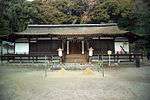 | 34°53′31″N 135°48′41″E / 34.89197576°N 135.81130699°E | Structures | National (NT) | |
| Ujigami Jinja Sessha Kasuga Jinja Honden 宇治上神社摂社春日神社本殿 Ujigami Jinja sessha Kasuga Jinja honden | Ujigami Jinja | late Kamakura period | 1 | 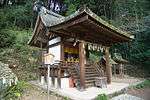 | 34°53′31″N 135°48′42″E / 34.89200261°N 135.81155871°E | Structures | National (ICP) | ||
| Uji Jinja Honden 宇治神社本殿 Uji Jinja honden | Uji Jinja | late Kamakura period | 1 |  | 34°53′28″N 135°48′39″E / 34.89107759°N 135.81072842°E | Structures | National (ICP) | ||
| Ukishima Thirteen-storey Stone Tō 浮島十三重塔 Ukishima jūsanjū-no-tō | Hōjō-in | late Kamakura period (1286) | 1 | 34°53′18″N 135°48′37″E / 34.88830472°N 135.81017834°E | Structures | National (ICP) | |||
| Hakusan Jinja Haiden 白山神社拝殿 Hakusan Jinja haiden | Hakusan Jinja | late Kamakura period (1277) | 1 | 34°52′38″N 135°48′46″E / 34.87714578°N 135.81287258°E | Structures | National (ICP) | |||
| Jūhachi Jinja Honden 十八神社本殿 Jūhachi Jinja honden | Jūhachi Jinja | late Muromachi period (1487) | 1 | | 34°54′03″N 135°49′09″E / 34.90073054°N 135.81909485°E | Structures | National (ICP) | ||
| Manpuku-ji 萬福寺 Manpukuji | Manpuku-ji | Edo period | 16 |  | 34°54′50″N 135°48′27″E / 34.91383139°N 135.80761864°E | Structures | National (ICP) | ||
| Manpuku-ji Shōindō 萬福寺松隠堂 Manpukuji shōindō | Manpuku-ji | Edo period | 7 | 34°54′52″N 135°48′23″E / 34.91450514°N 135.80626753°E | Structures | National (ICP) | |||
| Kohata Jinja Honden 許波多神社本殿 Kohata Jinja honden | Kohata Jinja | late Muromachi period (1562) | 1 | | 34°55′02″N 135°47′38″E / 34.91708588°N 135.79400064°E | Structures | National (ICP) | ||
| *Phoenix Hall Wall and Door Paintings 鳳凰堂中堂壁扉画(板絵著色) Hōōdō chūdō hekihiga (ita-e cho-iro) | Byōdō-in | Heian period (1053) | 14 | | Paintings | National (NT) | |||
| Honden Door Paintings 本殿扉絵(板絵著色) Honden tobira-e (ita-e cho-iro) | Ujigami Jinja | late Heian period | 4 | .jpg) | Paintings | National (ICP) | |||
| Portrait of Ingen 紙本著色隠元和尚像〈元規筆/〉 shihon choshoku Ingen oshō zō (Genki fude) | Manpuku-ji | Edo period | 1 | colour on paper; by Kita Genki (喜多元規) | 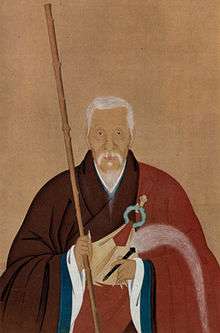 | Paintings | National (ICP) | ||
| Seated Wooden Statue of Amida Nyorai by Jōchō 木造阿弥陀如来坐像 定朝作 mokuzō Amida Nyorai zazō Jōchō-saku | Byōdō-in | Heian period (1053) | 1 | .jpg) | 34°53′21″N 135°48′28″E / 34.889277°N 135.807672°E | Sculptures | National (NT) | ||
| Wooden Canopy 木造天蓋 mokuzō tengai | Byōdō-in | Heian period (1053) | 1 | | 34°53′21″N 135°48′28″E / 34.889277°N 135.807672°E | Sculptures | National (NT) | ||
| Bosatsu on Clouds 木造雲中供養菩薩像 mokuzō unchū kuyō bosatsu-zō | Byōdō-in | Heian period (1053) | 52 |  | 34°53′21″N 135°48′28″E / 34.889277°N 135.807672°E | Sculptures | National (NT) | ||
| *Temple Bell 梵鐘 bonshō | Byōdō-in | Heian period | 1 | now at the Kyoto National Museum | | 34°59′24″N 135°46′25″E / 34.98995551°N 135.77351413°E | Applied Crafts | National (NT) | |
| *Gilt bronze phoenices from the Phoenix Hall 金銅鳳凰(鳳凰堂中堂旧棟飾) kondō hōō (Hōōdō chūdō kyū-munekazari) | Byōdō-in | Heian period | 1 pair | now at the Kyoto National Museum |  | 34°59′24″N 135°46′25″E / 34.98995551°N 135.77351413°E | Applied Crafts | National (NT) | |
| Iron half-tongue stirrups with copper-inlaid hōsōge and peacock design 鉄宝相華孔雀銅象嵌半舌鐙 tetsu hōsōge kujaku dōzōgan hanjita abumi | Kohata Jinja | Heian period | 1 pair | Applied Crafts | National (ICP) | ||||
| Temple Bell 梵鐘 bonshō | Shōmyō-ji | early Kamakura period (1210) | 1 | 34°56′14″N 135°52′21″E / 34.93709522°N 135.8725745°E | Applied Crafts | National (ICP) | |||
| Fragmentary Stele from Uji Bridge 宇治橋断碑 Uji-bashi danpi | Hōjō-in | Asuka period (646) | 1 | 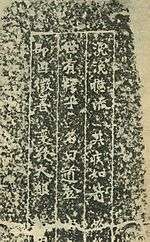 | Calligraphic works | National (ICP) | |||
| Manpuku-ji Miscellany 黄檗山木額・柱聯・榜牌 Ōbaku-san kigaku chūren bōhai | Manpuku-ji | Edo period | 97 | designation comprises 40 wooden tablets, 44 pillar inscriptions, and 13 plaques | Calligraphic works | National (ICP) | |||
| Manpuku-ji Miscellany 同下書 dō shitagaki | Manpuku-ji | Edo period | 14 | designation comprises 14 sketches | Calligraphic works | National (ICP) | |||
| Complete Woodblock Sutras (Tetsugen edition) 鉄眼版一切経版木 Tetsugen-ban issaikyō hangi | Hōzō-in | Edo period | 48,275 | Historic materials | National (ICP) | ||||
| Woodworking 木工芸 Moku-kōgei | Individual | 1 | holder of technique: Murayama Akira (村山明) | Intangible | National | ||||
| Byōdō-in Gardens 平等院庭園 Byōdōin teien | Byōdō-in | 1 | also a Place of Scenic Beauty |  | 34°53′21″N 135°48′46″E / 34.88908184°N 135.81272725°E | Historic Sites | National | ||
| Hayaagari Tile Kiln Site 隼上り瓦窯跡 Hayaagari kawara kama ato | Uji City | 1 | 34°54′23″N 135°48′35″E / 34.9063243°N 135.80964186°E | Historic Sites | National | ||||
| Uji River Taikō Embankment 宇治川太閤堤跡 Uji-gawa Taikō-zuzumi ato | Uji City | 1 | 34°53′46″N 135°48′18″E / 34.89617091°N 135.8049525°E | Historic Sites | National | ||||
| Cultural Landscape of Uji 宇治の文化的景観 Uji no bunkateki keikan | Uji City | 1 | 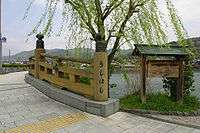 | 34°53′14″N 135°48′30″E / 34.88713734°N 135.80823926°E | Cultural Landscapes | National | |||
| Kiku-jutsu (modern) 規矩術 (近世規矩) kiku-jutsu (kinsei-kiku) | Individual | 1 | for architectural measurement; holder of technique: Mochida Takeo (持田武夫) | Conservation Techniques | National | ||||
| Mimuroto-ji Hondō 三室戸寺本堂 Mimurotoji Hondō | Mimuroto-ji | Edo period (1814) | 1 | | 34°54′02″N 135°49′09″E / 34.900473°N 135.819192°E | Structures | Prefectural | ||
| Mimuroto-ji Three-storey Pagoda 三室戸寺三重塔 Mimurotoji sanjū-no-tō | Mimuroto-ji | Edo period (1704) | 1 |  | 34°54′01″N 135°49′11″E / 34.900279°N 135.819777°E | Structures | Prefectural | ||
| Mimuroto-ji Old Bracket Block 三室戸寺旧鬼斗 Mimurotoji kyū-onito | Mimuroto-ji | Edo period | 1 | Structures | Prefectural | ||||
| Mimuroto-ji Old Tail Rafter 三室戸寺旧尾垂木 Mimurotoji kyū-odaruki | Mimuroto-ji | Edo period | 1 | Structures | Prefectural | ||||
| Mimuroto-ji Old Hondō Kaerumata 三室戸寺旧本堂蟇股 Mimurotoji kyū-hondō kaerumata | Mimuroto-ji | Edo period | 1 | Structures | Prefectural | ||||
| Manpuku-ji Precinct 萬福寺境内 Manpukuji keidai | Manpuku-ji | 1 | 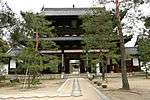 | 34°54′51″N 135°48′22″E / 34.914221°N 135.806068°E | Historic Sites | Prefectural | |||
| Kōshō-ji Gardens and Kotosaka 興聖寺庭園および琴坂 Kōshōji teien oyobi Kotosaka | Kōshō-ji | 1 | 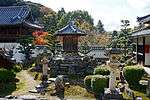 | 34°53′24″N 135°48′49″E / 34.890028°N 135.813736°E | Places of Scenic Beauty | Prefectural | |||
| Yūrin-an Shoin Gardens 養林庵書院庭園 Yūrin-an shoin teien | Yūrin-an | 1 | 34°53′19″N 135°48′25″E / 34.888613°N 135.806985°E | Places of Scenic Beauty | Prefectural | ||||
| Jōdo-in Rakan-dō 浄土院羅漢堂 Jōdo-in rakandō | Jōdo-in | Edo period (1640) | 1 | 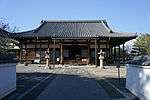 | 34°53′21″N 135°48′25″E / 34.889119°N 135.807063°E | Structures | Municipal | ||
Registered Cultural Properties
| Property | Owner | Date | No. of Assets | Comments | Image | Coordinates | Type | Level | Ref. |
|---|---|---|---|---|---|---|---|---|---|
| Orii Jinja Honden 下居神社本殿 Orii Jinja honden | Orii Jinja | Edo period (1656) | 1 | 34°52′48″N 135°48′04″E / 34.880069°N 135.801047°E | Structures | Prefectural | |||
| Asakura Jinja Honden 旦椋神社本殿 Asakura Jinja honden | Asakura Jinja | Edo period (1674) | 1 | 34°52′21″N 135°46′30″E / 34.872482°N 135.774912°E | Structures | Prefectural | |||
| Mimuroto-ji Amidadō 三室戸寺阿弥陀堂 Mimurotoji Amidadō | Mimuroto-ji | Edo period (1747) | 1 |  | 34°54′02″N 135°49′09″E / 34.900521°N 135.819195°E | Structures | Prefectural | ||
| Mimuroto-ji Shōrō 三室戸寺鐘楼 Mimurotoji Shōrō | Mimuroto-ji | Edo period (1689) | 1 |  | 34°54′01″N 135°49′10″E / 34.900345°N 135.819409°E | Structures | Prefectural | ||
See also
References
- 1 2 "Cultural Properties for Future Generations: Outline of the Cultural Administration of Japan" (PDF). Agency for Cultural Affairs. March 2013. Retrieved 6 July 2013.
- ↑ 宇治市の文化財 [Cultural Properties of Uji City] (in Japanese). Uji City. 20 April 2012. Retrieved 6 July 2013.
- 1 2 3 "Historic Monuments of Ancient Kyoto (Kyoto, Uji and Otsu Cities)". UNESCO. Retrieved 15 September 2012.
External links
This article is issued from Wikipedia - version of the 12/19/2015. The text is available under the Creative Commons Attribution/Share Alike but additional terms may apply for the media files.